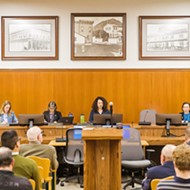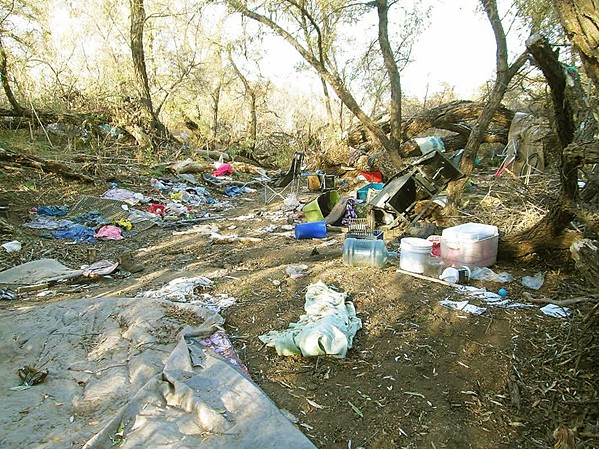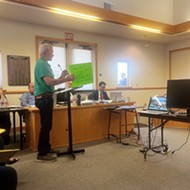[
{
"name": "Newsletter Promo",
"id": "NewsletterPromo",
"class": "inlineCenter",
"insertPoint": "4",
"component": "15264767",
"requiredCountToDisplay": "0"
},
{
"name": "Ad - Medium Rectangle CC01 - 300x250 - Inline Content",
"class": "inlineCenter",
"insertPoint": "8",
"component": "15582119",
"requiredCountToDisplay": "12"
},{
"name": "Ad - Medium Rectangle LC01 - 300x250 - Inline Content",
"class": "inlineCenter",
"insertPoint": "18",
"component": "15582122",
"requiredCountToDisplay": "22"
},{
"name": "Ad - Medium Rectangle 9 - 300x250 - Inline Content",
"class": "inlineCenter",
"insertPoint": "28",
"component": "15582121",
"requiredCountToDisplay": "32"
}]
Paso Robles plans to step up enforcement and cite illegal public campers thanks to a recent federal Supreme Court ruling and an executive order from Gov. Gavin Newsom.
In June, the federal court overturned the 2019 Martin v. Boise ruling that prevented local governments from criminalizing homelessness. Local governments can now impose criminal charges on public campers, even if they don't have enough beds for unsheltered residents. Newsom's state order that followed the federal decision asks agencies to address encampments "with urgency and dignity."
Paso City Manager Ty Lewis asked City Council members at the Aug. 6 meeting to approve an ordinance amending the city's municipal code on public camping and protection of local waterways, saying that the recent ruling removed barriers for Paso law enforcement as it continuously clears out encampments and tries to clean the Salinas River corridor.
While the city is dealing with the issue through its recently established Strategic Plan to Address Homelessness by using community organizations and professionals for better resources for mental health, substance addiction, and affordable housing, Lewis said there are some residents who still refuse help. This is when enforcement is required.
Lewis said the city can't arrest its way out of the problem, however, and Paso intends to help unsheltered residents under the strategic plan. He also said that by allowing enforcement, he believed the federal and local court and criminal systems will be better aligned.
"We want to provide our community and our emergency services with the most options to be able to enforce, as well as use the opposite of the spectrum to connect," he said. "I think the city is in a good position as we move forward when we look to better address the challenges we have."
Councilmember Chris Bausch asked when enforcement would begin in the riverbed, and Lewis said the cleanups had never ceased.
"We have never stopped removing camps," Lewis said.
"Evidence in my eyes says otherwise," Bausch said, referring to defecation he had seen in the riverbed. "Hopefully we can do a better job."
Councilmember Sharon Roden asked what the process of a cleanup looks like.
"We can't just go in and throw people in the back of a truck and all of their stuff go to the trash pile," she said. "What's the actual reality of cleaning out and the efforts, and why do we have to continue this process over and over?"
Lewis said it's like a game of "Whack-A-Mole" in the sense that unsheltered residents move to new camping spots down the road when one gets cleaned out.
"Hopefully, that alignment occurs with the courts and with the justice system because we can move camps and we can cite people, but if the courts don't hold anyone accountable for it, it's a toothless tiger when it comes to our abilities," Lewis said.
Lewis said there is not one fix-all solution, and the issue requires a variety of approaches. However, enforcement would provide the "balance" that law enforcement has needed to address the current issues and provide the city with a more "assertive posture."
Despite the ability to enforce and clear out encampments, Lewis said the city is still required to provide a three-day notice of eviction under the Constitution because all residents, sheltered and unsheltered, have a right to their property and time to remove personal effects.
Although a solution for homelessness is far off, Lewis said enforcement is a step in the right direction.
"I can't underscore enough how good of a thing this is for municipalities," he said.
The council passed the amendment unanimously.
"It's a good first step of many that need to come," Bausch said. Δ
Latest in News
Readers also liked…
-

When the levee breaks: Oceano residents, county officials walk a tightrope of regulations to manage Arroyo Grande Creek, which some say led to the levee's failure in January
May 18, 2023 -

Cal Poly report highlights offshore wind's potential to spur green energy transition
Jun 8, 2023 -

Cal Poly students demand rent control, accountability for substandard housing from SLO City Council
Jun 22, 2023









